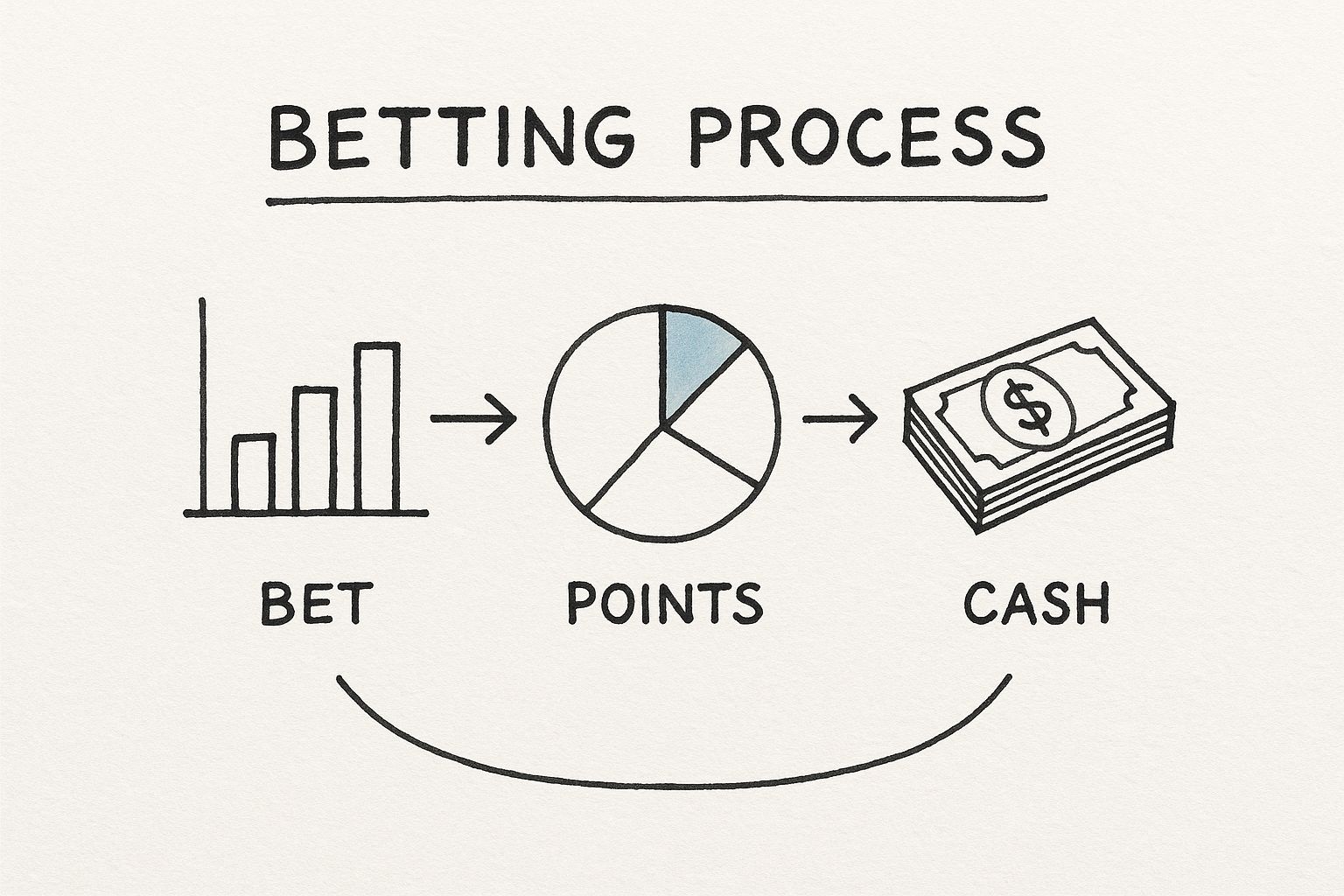Understanding Football's Hidden Scoring System
Imagine a match unfolding, not just on the scoreboard, but in a parallel universe of yellow and red cards. That's the world of booking points betting, where you're not just watching the game, you're tracking a hidden scoring system based on referee decisions. It's like having a secret insight, deciphering the language of fouls while others focus on goals and saves.
Think of a fiery local derby, tackles flying, tempers flaring. The score might be 0-0, but the booking points could be climbing steadily. This offers a unique betting angle, less crowded than traditional goal markets. Booking points betting isn't about wanting players to get booked, it's about understanding the strategic value of cards and how they influence the game, and the betting odds.
The image above shows the universal symbols of football discipline: the yellow and red cards. These seemingly simple pieces of card hold immense weight, changing the dynamics of the game and the outcome of booking points bets. Understanding their role in this betting system is crucial for spotting valuable opportunities.
Talk to experienced bettors, and they'll tell you how booking points betting can offer a real advantage. They’ll explain the psychology of referees, giving you an edge over casual fans. This isn’t about luck; it's about understanding the nuances of the game and exploiting a market often overlooked. Just like predicting goals, learning to anticipate the ebb and flow of cards opens up a whole new dimension to football betting. It empowers you to make more informed decisions, looking beyond the obvious and tapping into the often-untapped potential of booking points.
Decoding The Points System That Powers Your Bets
Think of booking points in football betting like a scoring system for player behavior, specifically yellow and red cards. It's a key element in a specialized type of bet that focuses on the disciplinary aspect of the game. The fundamental principle is simple: yellow cards are typically worth 10 points, and red cards are worth 25.
However, just like football itself, the seemingly straightforward nature of booking points betting has its nuances. Different bookmakers, like Bet365 and William Hill, might have slight variations in their points systems. Perhaps one might award a different value for a second yellow card that results in a sending-off. These seemingly small differences can actually create valuable opportunities for bettors who know where to look.

5f05ba58-2b5d-4aeb-9da6-c0a242549942.jpg
The infographic above illustrates the journey of a booking points bet, from placing your wager to the accumulation of points and, finally, the potential payout. It clearly shows how the points earned directly translate into potential winnings.
Understanding the Nuances
Understanding the specific rules of each bookmaker is crucial for maximizing your potential returns. It's like knowing the strengths and weaknesses of each team you're betting on. This knowledge can help you identify favorable odds and exploit discrepancies between different bookmakers.
Another crucial factor is the timing of a card. A red card in the 15th minute has a far greater impact on the game than one shown in injury time. The team playing a man down for most of the match is more likely to concede goals and, potentially, commit more fouls.
To illustrate the variations in booking points systems, let's look at the following table:
Booking Points Values Across Major UK Bookmakers
How leading bookmakers calculate points from yellow and red cards
| Card Type | Standard Points | Bet365 | William Hill | Special Conditions |
|---|---|---|---|---|
| Yellow Card | 10 | 10 | 10 | |
| Red Card (Straight Red) | 25 | 25 | 25 | |
| Second Yellow Card Leading to Red | 25 | 35 | 25 | Bet365 adds the value of the second yellow (10) to the standard red card value (25) |
As you can see, while the standard points are generally consistent, there are differences, such as Bet365's higher value for a second yellow leading to a red. Being aware of these nuances can be the difference between a winning and a losing bet.
Applying the Knowledge
Seasoned bettors understand these subtle but significant differences. They realize that a late red card, while contributing to the total booking points, might not significantly shift the in-play odds. This understanding helps them make more calculated decisions, especially in the fast-paced world of live betting.
By learning to analyze these factors, you can elevate your booking points betting strategy from guesswork to informed decision-making. It's about seeing the bigger picture, considering the context of the game, and understanding how the timing of cards can influence the outcome, much like a football manager strategizes during a match. Through careful observation and a deep understanding of the system, you can gain a significant edge.
Navigating Markets That Most Punters Miss Completely

77e4f886-ae62-47cb-a8e4-99026084d26c.jpg
While many punters focus on predicting the number of goals, booking points betting offers a different perspective. Think of it like this: most football fans enjoy a match from their seats, but the referee sees a different game unfold. Booking points markets are like the referee’s perspective, focusing on the disciplinary actions within a match. This can range from simple over/under bets on the total number of booking points to more specific bets on individual teams or even half-time booking points.
Exploring Different Booking Points Markets
This range of options provides numerous opportunities. Instead of just forecasting goals, you're analyzing player behavior and refereeing styles. For instance, a heated derby between Manchester United and Arsenal is likely to have a different booking points profile than a less intense match between two lower-table teams. This means your betting strategy should adapt: you might consider an "over" bet for the derby, while an "under" bet might be more suitable for the less important match, particularly if a draw suits both sides.
Individual players can also influence your decisions. Some players are more prone to yellow and red cards. If these players are involved in a crucial fixture, it could sway your booking points prediction. However, relying solely on player reputations isn't enough in today’s sophisticated betting environment. The UK sports betting market is complex and evolving. Projections for 2025 suggest a market revenue of US$6.35 billion, growing at a CAGR of 3.86% from 2025 to 2029. This underscores the need for strategic betting, using insights like booking points, rather than just relying on hunches. Learn more about the evolving UK betting market here.
Why Booking Points Offer Unique Value
Understanding how bookmakers set their lines for booking points is also essential. Some fixtures, based on past results or specific team dynamics, consistently result in high or low booking point totals. Spotting these trends can give you an edge. It's like knowing which referees are more likely to issue cards; it adds another dimension to your pre-match research.
Booking points betting offers seasoned punters a less crowded marketplace. It allows for more specific predictions and often presents better value than simply betting on goals. This doesn’t mean discarding traditional markets; it's about diversifying your strategies and exploring areas often ignored by casual bettors. These less obvious aspects of the game can often reveal profitable opportunities. This shift in focus, from the obvious to the more subtle, is often what separates consistent winners from the rest.
Proven Strategies From Successful Booking Points Punters
Forget relying on luck; consistent success in booking points betting demands a more strategic, thoughtful approach. It's about delving into the psychology of football, understanding the pressures and motivations that influence players and, interestingly enough, referees. We've spoken to punters who consistently profit from booking points, and we're sharing their systematic approaches here.
Referee Appointments: The Hidden Influence
One crucial strategy revolves around referee appointments. Think of it like this: some referees are strict disciplinarians, quick to pull out a card, while others prefer to let the game flow. Seasoned booking points punters know this and actively track referee appointments. It's a bit of insider knowledge that can give you a significant edge. By knowing who the referee is, you can get a sense of the potential for cards before a match even starts. For example, combining referee tendencies with team statistics like those found on Swansea City stats can paint a fuller picture.
Fixture Types and Pressure Situations
Certain fixture types are also more likely to produce booking points. Think of a heated local derby, where emotions run high and tackles fly in. Or a relegation battle, where every point is precious and players are under immense pressure. These high-stakes situations often lead to more cards being shown. Understanding the psychological impact of these pressures is key to successful booking points betting.
Specialization and Bankroll Management
Many successful punters specialize. Some focus on particular leagues, while others concentrate solely on specific referees. It's like becoming a local expert, intimately familiar with the trends and tendencies of certain teams, players, and officials within their chosen niche. This deep understanding can lead to consistent, profitable results.
In addition to specialization, these punters also understand the importance of bankroll management. They know that even the best strategies won't win every time. They treat their betting funds carefully, avoiding emotional decisions and sticking to a disciplined approach. It's a long-term game, and responsible bankroll management is crucial for sustained success. As a side note, even broader online gambling trends reflect growth. The UK's online Gross Gambling Yield (GGY) rose by 7% year-over-year in the first quarter of 2025, hitting about £1.45 billion (or $1.93 billion). You can find more about this here.
By combining these strategies with real-world examples and practical advice, you can gain a real advantage in booking points betting. It's not about guaranteed wins, but about a systematic approach that allows you to make smarter decisions and find value where others don't.
The Hidden Forces That Shape Every Booking Points Bet

408d4727-e871-469e-b259-5dd1a8ef969a.jpg
Booking points bets can seem simple at first glance. Just predict the number of cards, right? But it's much more nuanced than that. It’s about understanding the subtle, often unseen, influences that can transform a predictable match into a flurry of yellow and red. These "hidden forces," often missed by less experienced bettors, are the key to consistently finding value in this market.
Think about the weather, for example. A slippery, rain-soaked pitch is a recipe for misplaced tackles and frustrated players, making cards much more likely. Or consider the impact of a roaring, hostile crowd. Referees, whether consciously or not, can be swayed by the atmosphere, especially in closely contested matches.
Tactical Analysis and Playing Styles
Match importance is another critical factor. The pressure of a relegation battle or a crucial Champions League fixture can dramatically change player behavior. Imagine a player fighting to keep his team in the Premier League. He's far more likely to commit a tactical foul than in a mid-table match with little on the line. Even media scrutiny can influence refereeing decisions, particularly in high-profile games where officials might be tempted to make “statement” calls under the spotlight.
Tactical analysis is also essential for successful booking points betting. A team known for its robust, defensive style, like Atletico Madrid, is more likely to rack up cards against attacking sides. Conversely, possession-based teams often have lower booking point totals. For specific team stats, resources like StatsHub for Real Valladolid can offer valuable insights. Understanding these stylistic clashes can reveal predictable booking points patterns. Even certain stadiums, notorious for their intense atmospheres, consistently see higher card counts.
Let's look at how different match situations and pressure levels influence booking points. The following table provides a helpful overview:
Average Booking Points By Match Context And Pressure Level
How different match situations and stakes affect average booking points totals
| Match Context | Average Points | Key Drivers | Betting Implications |
|---|---|---|---|
| Low-stakes mid-table clash | 20-30 | Neutral atmosphere, less pressure | Fewer cards expected |
| Relegation battle | 40-50 | High pressure, desperate tackles | Higher likelihood of cards |
| Top-of-the-table clash | 35-45 | Intense competition, tactical fouls | Moderate to high card potential |
| Cup final | 45-55 | Highest stakes, emotional intensity | Significant card potential, especially in extra time |
| Local derby | 50-60 | Historical rivalry, aggressive play | High card counts are common |
As you can see, context matters. A low-stakes mid-table game is likely to produce far fewer cards than a heated derby or a crucial cup final.
Early Bookings and Substitute Timings
Through statistical analysis and real-world examples, we can see the ripple effect of early bookings. An early red card can completely change a game’s dynamics, leading to more fouls and a higher probability of additional cards. Even the timing of substitutions matters. Introducing a fresh, energetic player late in the game, especially when chasing a goal, can increase the risk of late bookings.
By learning to spot these pre-match indicators, you can begin to differentiate between potential high-card matches and quieter affairs. This deeper understanding of the forces at play elevates booking points betting from a gamble to an informed prediction. It's about seeing beyond the goals and recognizing the subtle nuances that shape the final booking points tally.
Real Matches That Reveal Booking Points Gold
Booking points betting isn't just some abstract theory. It truly comes alive when you apply it to actual football matches. Let's take a look at a hypothetical Champions League clash between Liverpool and Inter Milan, a fixture known for its tactical fouls.
Imagine pre-match analysis suggested a card-heavy game. Knowing the referee's reputation for early bookings would further solidify this prediction. This kind of pre-match insight could prove incredibly valuable, potentially leading to profitable bets on "over" booking points.
Now, let's shift gears and consider a different scenario: a hypothetical Championship relegation battle between Huddersfield and Rotherham. The pressure in a game like this is immense, impacting both player behavior and refereeing decisions.
Pre-match analysis here wouldn't just focus on the teams' styles but also on the referee’s history in high-pressure situations. If this combined analysis pointed towards a higher probability of cards, focusing on booking points betting might prove insightful again.
Learning From Both Wins and Losses
Examining real matches also teaches us valuable lessons, even when we lose. Suppose a predicted card-heavy Premier League match between, say, Everton and Leeds United, ended with surprisingly few bookings. Analyzing why the prediction failed is crucial for future bets.
Was the referee unusually lenient? Did the teams play more cautiously than expected? Understanding these factors helps refine future booking points strategies. For example, Valencia's matches often showcase the tactical side of booking points. You can delve into their team statistics here.
These case studies highlight that understanding what doesn't work is just as important as celebrating wins. This continuous learning process is essential for developing a nuanced approach to booking points betting. It emphasizes the need for ongoing research and adaptation in a dynamic sport like football.
Different Scenarios, Different Strategies
Different match scenarios create unique booking points opportunities. Think of heated local derbies like the Merseyside clash between Liverpool and Everton, where emotions often run high.
European nights, especially in knockout stages, often see an increase in tactical fouling as teams desperately seek an advantage. Even seemingly less important fixtures can become booking points goldmines if a strict referee is in charge.
As an interesting aside, the UK gambling market, largely driven by online platforms, is expected to grow by USD 3.51 billion between 2025 and 2029, at a CAGR of 5.4%. You can find more information on this growth here.
Every example, win or lose, offers valuable insights. This includes pre-match analysis, the reasoning behind the bet, and lessons for similar future situations. By studying real matches, bettors can go beyond theory and develop a practical, nuanced understanding of booking points betting, recognizing the interplay of player behavior, refereeing tendencies, and the specific match context. This analytical approach is what separates successful booking points bettors from the rest.
Your Blueprint For Booking Points Success
There's no secret formula for winning every booking points bet. Instead, think of building a blueprint for success: a structured approach that gives you an advantage over time. It combines smart analysis with disciplined betting. Just like a house needs a solid foundation, your betting strategy needs structure.
Your Pre-Match Checklist
Seasoned booking points bettors don't rely on hunches. They have a pre-match checklist, examining key factors others miss. This checklist becomes your roadmap:
- Referee Analysis: Research the referee. Do they tend to give out a lot of cards, or are they more lenient? This is like knowing a team's playing style – vital pre-match information.
- Team Dynamics: Consider how each team plays. Do they tackle aggressively or prefer possession? Understanding this helps predict cards.
- Match Context: Is it a fierce local derby, a relegation battle, or a mid-table game with little on the line? The situation greatly affects player behavior and refereeing.
- Value Identification: Look beyond the obvious bets. Search for value in less popular markets, like team-specific booking points or first-half totals, which often have better odds.
Avoiding Emotional Gambles
A major betting pitfall is emotional decision-making. That late red card might seem like a sure bet for "over" booking points, but is it really? Separate smart bets from emotional reactions.
Set clear rules for your bets and follow them. If a bet doesn't fit your criteria, don't place it. It’s about informed choices, not chasing losses or getting carried away.
Practical Tools and Tracking
Successful booking points betting needs data. Use tools to track referee tendencies, seasonal patterns, and, crucially, your own results.
- Referee Tracking: Record referees and their average card counts. This helps predict their future matches.
- Seasonal Trends: Some parts of the season might have more bookings due to fixture congestion or crucial games. Learn to spot these trends.
- Performance Tracking: Analyze your betting history. What's working, and what isn't? Honest self-assessment is essential for improving.
Building Sustainable Habits
Long-term success comes down to sustainable habits. This means realistic expectations, proper staking plans, and avoiding common beginner mistakes.
Booking points betting isn't a quick way to get rich. It's a disciplined approach based on research and smart decisions. By using these strategies, you're not just gambling; you're investing in your football knowledge and improving your chances of long-term profits.
Ready to improve your football analysis and betting strategy? Visit StatsHub.com for detailed player and team stats, league tables, and more. Use data-driven insights to make smarter bets and find hidden opportunities in booking point markets and beyond.
